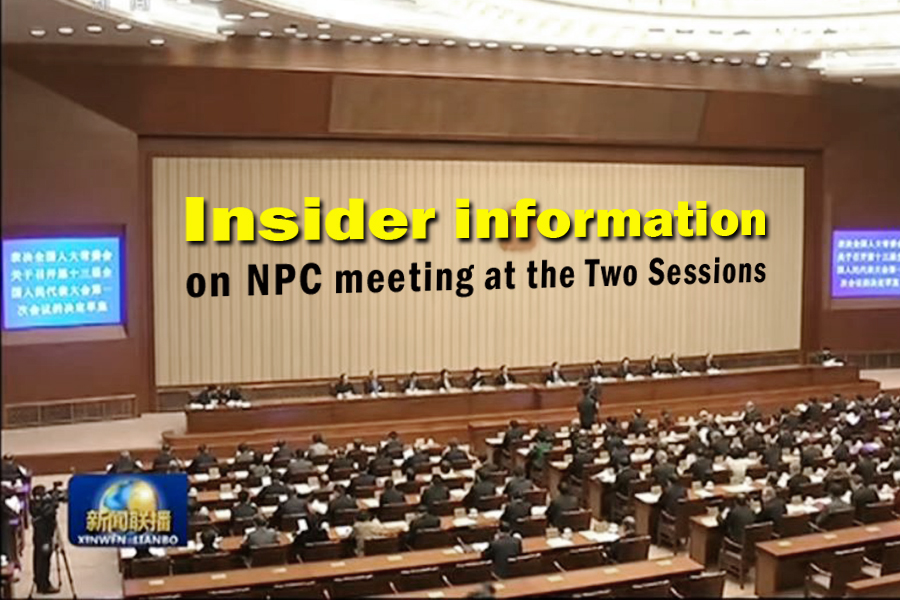◎ We believe that the NPC meeting this year is extended by three days for its members to deliberate the draft resolution proposed at the Third Plenum.
We recently learned from sources inside the Chinese Communist Party (CCP) about two changes to the first session of the new National People’s Congress (NPC) at the Two Sessions:
1. On the agenda are “exploratory discussions” (“yun niang”) about personnel issues.
2. The NPC meeting could be extended three days past the regular schedule, or from March 5 to March 20 instead of March 5 to March 17.
The backdrop:
1. Per the first NPC meeting of the 18th Central Committee (March 5 to March 17, 2013), meetings were held in four units:
First unit (3-and-a-half days): NPC members listened to and deliberated government work reports; reviewed and approved planning reports; reviewed and approved budget reports; and voted through the NPC Financial and Economic Committee member list.
Second unit (3-and-a-half days): NPC members listened to and deliberated the work reports of the NPC Standing Committee, the Supreme People’s Court, and the Supreme People’s Procuratorate. Deliberate the State Council institutional reform and functional changes program.
Recess on March 12.
Third unit (4 days): Elections for key NPC, State Council, central bank, and judiciary members were held:
- NPC Standing Committee chairman, vice chairman, secretary-general, regular members
- NPC chairman and vice chairman
- State Council premier and vice premiers
- State Council councilors, department and ministry heads, auditor-general, and secretary-general
- People’s Bank of China president
- Central Military Commission of the State Council chairman, vice chairs, and members
- Supreme People’s Court chief justice
- Supreme People’s Procuratorate procurator-general
- Members of the eight NPC special committees
Fourth unit (Half a day): NPC members deliberated draft resolutions of the NPC general assembly, proposed voting, and held a closing ceremony.
2. According to the 19th Central Committee Third Plenum communique released on Feb. 28, the NPC will deliberate a draft resolution on deepening reform of Party and state institutions.
Our take:
1. We believe that the NPC meeting this year is extended by three days for its members to deliberate the draft resolution proposed at the Third Plenum, and discuss personnel arrangements for the new state institutions.
The description of personnel talks as “exploratory discussions” suggests that the structure of the State Council should remain unchanged after the Two Sessions. The session could count as preliminary discussions for future personnel movement.
2. This round of reforms to state institutions should see the merging of Party and state institutions with overlapping functions, and the sharing of Party and state personnel. For instance, the Central Commission for Discipline Inspection and the new National Supervision Commission could share offices and duties. The reforms can be interpreted as the Party strengthening its control over the state government, or a transition of sorts where the Party’s authority is being handed over to the state government.
Also, state agencies and commissions with similar functions could merge, such as a shift from a “central bank and three commissions” financial oversight structure to a “central bank plus one commission” model. (See “Why China’s Financial Oversight Agencies May be Merging”)
3. Xi Jinping’s state institutions reform and power rebalancing could serve a similar function as his military modernization reforms, which is to clean out the Jiang faction’s remaining presence. Xi will likely focus on cleaning up the national security and intelligence apparatus, the united front apparatus, the propaganda apparatus, and the diplomatic apparatus.












